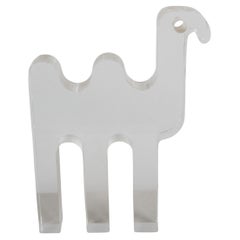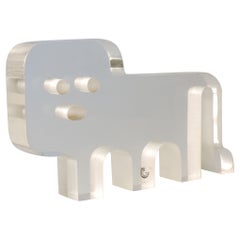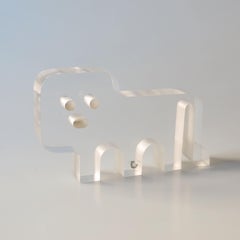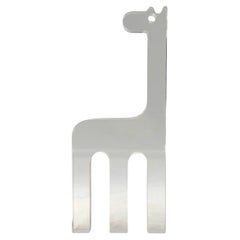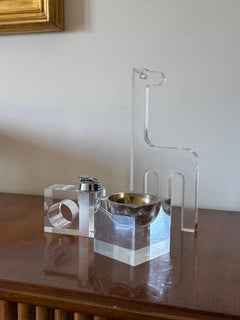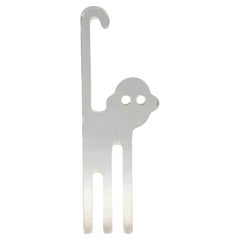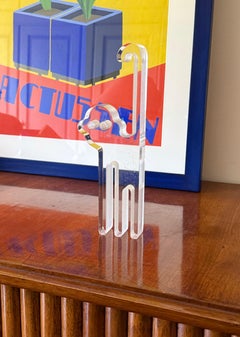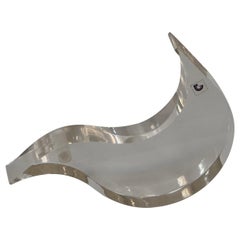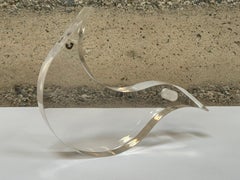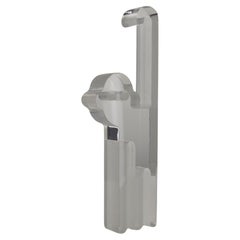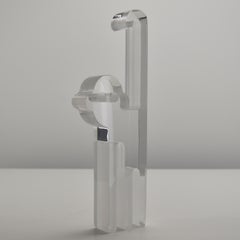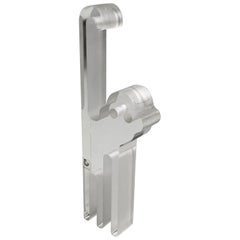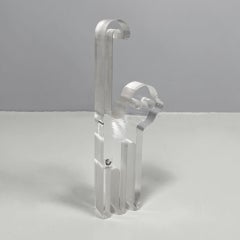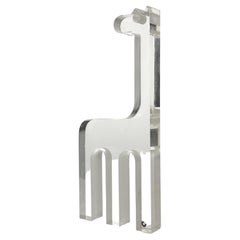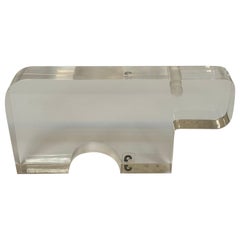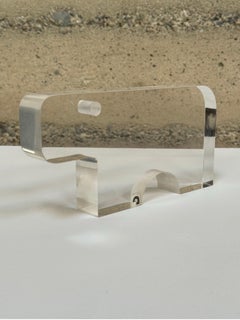With a vast inventory of beautiful furniture at 1stDibs, we’ve got just the silvio russo you’re looking for. Frequently made of
lucite,
plastic and
acrylic, every silvio russo was constructed with great care. Whether you’re looking for an older or newer silvio russo, there are earlier versions available from the 20th Century and newer variations made as recently as the 20th Century. A silvio russo is a generally popular piece of furniture, but those created in
Mid-Century Modern and
Modern styles are sought with frequency.
Guzzini and
Poltrona Frau each produced at least one beautiful silvio russo that is worth considering.
Guzzini is often mistakenly thought to be the name of a lighting designer active in the 1960s and 1970s. But in fact the label belongs to a lighting manufacturing company that was founded by six Guzzini brothers — Raimondo, Giovanni, Virgilio, Giuseppe, Adolfo and Giannunzio, who were inspired by the 1950 film Harvey starring James Stewart.
Compounding the historical record even further, it seems that the Guzzini company rebranded many times in the 20th century, going by, at various points, Harvey Creazioni, Harvey Guzzini, Guzzini, iGuzzini and Illuminazione Guzzini. Harvey Creazioni was originally founded in 1959 in Recanati (on the east-central coast of Italy) by Raimondo, focusing on the production of copper-plated decorative objects. Four years later, in June 1963, the six brothers joined together and established Harvey Creazioni di Guzzini, expanding production to include pendant lighting, sconces, table lamps and floor lamps.
The brothers employed architect-designer Luigi Massoni — who was introduced to the Guzzini brothers by leading plastic importer Maurizio Adreani — as head of design, branding, public relations and advertising. Famous Harvey Guzzini designs include Massoni and Luciano Buttura's Mushroom table lamp (1965) as well as the in-house designed Arc floor lamp (1968), Faro table lamp (1970) and Toledo table lamp (1973). Studio 6G, an interning design team, developed the collectible Clan table lamp (1968); and designers Ermanno Lampa and Sergio Brazzoli were responsible for the Nastro series (1970), Orione pendant (1970), Sirio table lamp (1970), Alba floor lamp (1973), Albanella table lamp (1973) and Alf series (1976). Around 1976, Harvey Guzzini ceased the production of copper-plated items to concentrate on lighting made almost exclusively from methacrylate plastic (acrylic). The company also dabbled in furniture production, collaborating with Yugoslavian furniture producer Meblo, located in Nova Gorica in present-day Slovenia.
In 1967–68, the company exhibited at Domus: Formes Italiennes in the Galeries Lafayette in Paris under the name Design House (DH), where the company featured Gio Ponti’s Media lamp. A retail outlet was opened in central Milan under the name Harvey Guzzini-DH in 1969, situated literally and figuratively among the best known Italian design houses. In 1974, the company rebranded once more as iGuzzini, adding Illuminazione in 1981, which still exists today with headquarters in Recanati, Italy.
Find a collection of vintage Guzzini furniture today on 1stDibs.
Arguably the world’s most ubiquitous man-made material, plastic has impacted nearly every industry. In contemporary spaces, new and vintage plastic furniture is quite popular and its use pairs well with a range of design styles.
From the Italian lighting artisans at Fontana Arte to venturesome Scandinavian modernists such as Verner Panton, who created groundbreaking interiors as much as he did seating — see his revolutionary Panton chair — to contemporary multidisciplinary artists like Faye Toogood, furniture designers have been pushing the boundaries of plastic forever.
When The Graduate's Mr. McGuire proclaimed, “There’s a great future in plastics,” it was more than a laugh line. The iconic quote is an allusion both to society’s reliance on and its love affair with plastic. Before the material became an integral part of our lives — used in everything from clothing to storage to beauty and beyond — people relied on earthly elements for manufacturing, a process as time-consuming as it was costly.
Soon after American inventor John Wesley Hyatt created celluloid, which could mimic luxury products like tortoiseshell and ivory, production hit fever pitch, and the floodgates opened for others to explore plastic’s full potential. The material altered the history of design — mid-century modern legends Charles and Ray Eames, Joe Colombo and Eero Saarinen regularly experimented with plastics in the development of tables and chairs, and today plastic furnishings and decorative objects are seen as often indoors as they are outside.
Find vintage plastic lounge chairs, outdoor furniture, lighting and more on 1stDibs.
Styling your home with vintage, new and antique sculptures means adding a touch that can meaningfully transform the space. By introducing a sculptural work as a decorative finish to any interior, you’re making a statement, whether you tend toward the dramatic or prefer to keep things casual with modest, understated art.
A single, one-of-a-kind three-dimensional figurative sculpture mounted on your dining room wall is a guaranteed conversation piece, while a trio of abstract works arranged on your living room bookshelves can add spontaneity to the collection of first-edition novels or artist monographs you’re displaying as well as draw attention to them. Figurative sculptures are representational works that portray a specific person, animal or object. And while decorating with busts, which are sculpted or cast figurative works, hasn’t exactly topped the list of design trends every year, busts are back. According to designer Timothy Corrigan, “They give humanity in a way that a more abstract sculpture can’t give.” Abstract sculptures, on the other hand, are not meant to show something specific. Instead, they invoke a mood or scene without directly stating what they are portraying.
Busts made of stone or metal may not seem like a good fit for your existing decor. Fortunately, there are many ways for a seemingly incongruous piece to fit in with the rest of your room’s theme. You can embrace a dramatic piece by making it the focal point of the room, or you can choose to incorporate several elements made out of the same material to create harmony in your space. If an antique or more dramatic piece doesn’t feel like you, why not opt for works comprising plastic, fiberglass or other more modern materials?
When incorporating sculpture into the design of your home — be it the playful work of auction hero and multimedia visionary KAWS, contemporary fiber art from Connecticut dealer browngrotta arts or still-life sculpture on a budget — consider proper lighting, which can bring out the distinctive aspects of your piece that deserve attention. And make sure you know how the size and form of the sculpture will affect your space in whole. If you choose a sculpture with dramatic design elements, such as sharp angles or bright colors, for example, try to better integrate this new addition by echoing those elements in the rest of your room’s design.
Get started on decorating with sculpture now — find figurative sculptures, animal sculptures and more on 1stDibs today.
